In 5779, there was simply a bounty of excellent Jewish television. From shows featuring a Jewish protagonist, episodes filled with Jewish references, and scenes that meaningfully addressed Jewish identity, we saw ourselves reflected back on the small screen this year. Here are the awards for the best Jewish television this past (Hebrew) year.
JUMP AHEAD: THE BEST OF THE BEST / REPRESENTATION / SUPER JEWY / MISCELLANEOUS
The Best of the Best
The Best Jewish TV Series
Broad City. How could we not?
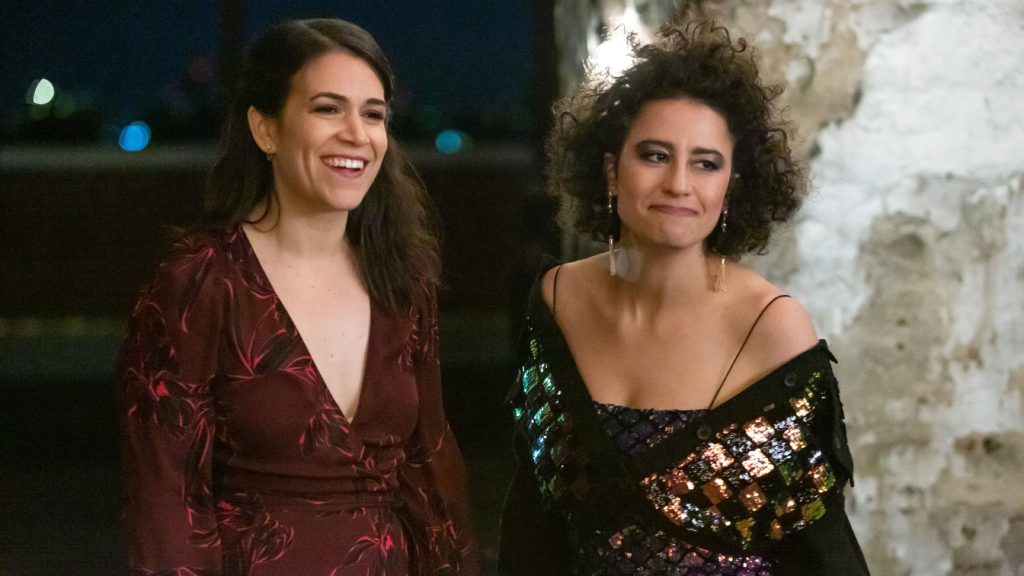
It was a bittersweet year for Broad City fans as we said goodbye to our beloved Jewesses just tryin’ to make a buck. But Abbi Jacobson and Ilana Glazer stepped up to the challenge of closing out their incredible series and knocked it out of the fucking park. What’s more, they somehow turned a show that’s always been incredibly Jewy and made it even more so. Special shout-out to the surprisingly touching episode in which the duo befriend — and then lose — a Holocaust survivor after busting him out of his retirement home.
The final season also gave us a chance to see the characters of Abbi and Ilana grow from barely employable early-20-somethings to women coming to terms with adult life while still staying true to their authentic selves. As we wrote of the series finale, “what Broad City understands phenomenally well about change is that it’s not all-encompassing, and in many ways, no matter how much their circumstances adjust, Abbi and Ilana are the same two Jewesses we’ve known all along.”
How did Broad City beat out Russian Doll, Crazy Ex-Girlfriend, Schitt’s Creek, and Marvelous Mrs. Maisel (“The show that makes audiences sit up and say, ‘Wait, is this anti-Semitic?'” as Andy Sandberg joked at the Golden Globes this year)? It captured millennial Jewish women. It captured us.
The Best Jewish TV Character
Nadia, Russian Doll.
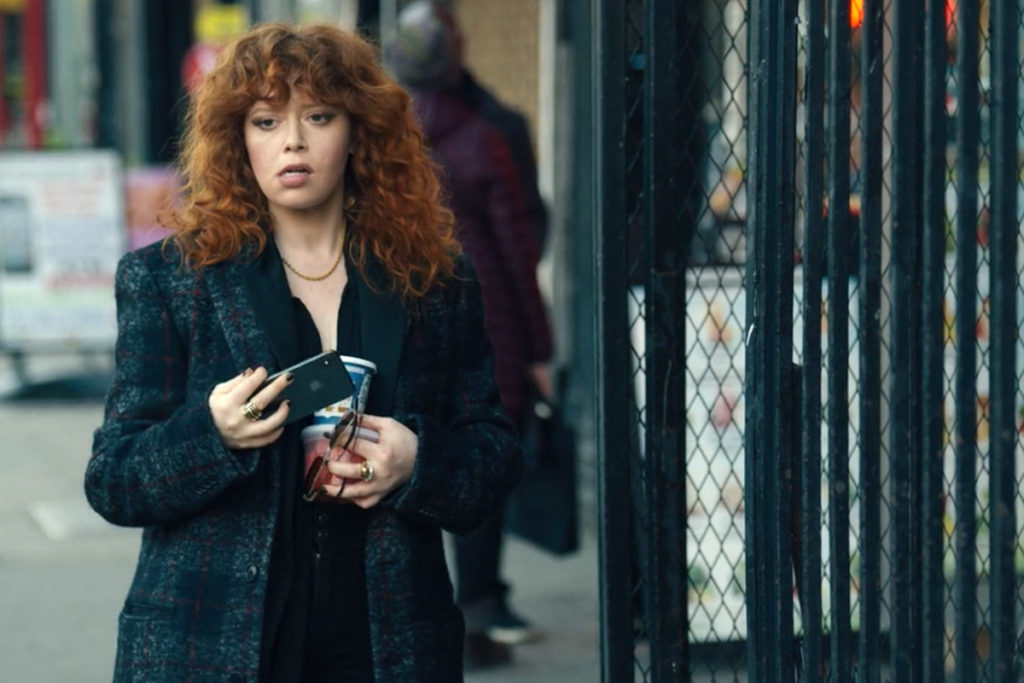
As we wrote earlier this year, Jewishness is embedded into Russian Doll‘s DNA. Not just because of star Natasha Lyonne, who was raised in an Orthodox Jewish family, and not just because of the way she pronounces cockroach (“cock-a-roach”), and no, not because of the Israeli drugs that are a plot point — but because the show deeply grapples with Jewish identity through the character of Nadia.
The first season centers on Nadia’s 36th birthday, a significant number in Hebrew numerology (18 is chai, or life, and 36 is double chai, or two lives). In one episode, while trying to figure out why she keeps dying and coming back to life, Nadia starts to think it’s because the building she was in used to be a yeshiva. She seeks out a local rabbi, and ends up speaking to his assistant, Shifra. Nadia lets her guard down, just a bit, and asks for a prayer; Shifra ends up reciting the bedtime Shema, and Nadia becomes visibly emotional.
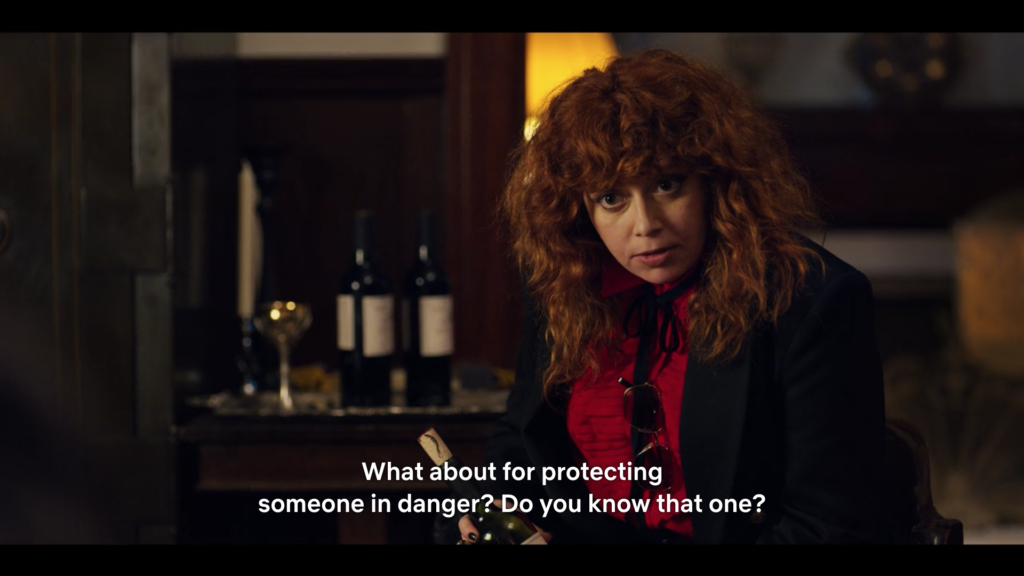
So much of the story is Nadia resisting her Jewishness (“Religion is dumb as fuck, all right? It’s racist. It’s sexist. There’s no money in it… anymore. Who needs it?” she tells her friends), but ultimately, it’s in her heritage that she finds peace.
The Show We’re Sitting Shiva For
Crazy Ex-Girlfriend. Rebecca Bunch was the nuanced Jewish heroine we needed. Played by co-creator of the show, the unstoppable Rachel Bloom, she was a vulnerable, funny, anxious, petite Jewess (we’ll get to that later). And Crazy Ex-Girlfriend as a whole was a breath of fresh TV air. The premise seemed, well, crazy: a woman picking up and moving across the country with the hopes of reconnecting with her camp boyfriend. But as we soon learned, it’s a lot more nuanced than that.

The show addressed everything from mental health to relationships to bisexuality. It was diverse, funny, and each musical number was deeply creative. So many of the songs will remain iconic (“Period Sex,” anyone?! Or “Gettin’ Bi”? Or “I Gave You a UTI”!?). And while the show was not nominated for many Emmys — except for its very important tune about anti-depressants — it’s a real winner for us. (Almas > Emmys, right?)
The Best Israeli TV Show
Shtisel. Who would’ve thought that in 2019, the world would be obsessed with a fictional ultra-Orthodox family from Jerusalem?! Shtisel has captivated audiences across the world, thanks to Netflix’s release of the show’s two seasons back in the beginning of the year (the last season aired in Israel in 2016). This show has everything: love, betrayal, intrigue, a tortured artist played by dreamy Israeli actor Michael Aloni, and so much more. And yet what makes Shtisel so captivating is that it manages to portray the lives of those in the ultra-Orthodox community without fetishizing them. And thanks to the show’s renewed popularity on Netflix, we may have a third season of Shtisel to look forward to! Fingers crossed!
The Best Israeli Adaptation
Euphoria. Loosely based on the Israeli show of the same name, and heavily based on Jewish writer Sam Levinson’s adolescence, Euphoria is a sensationalized depiction of the American high school experience. Trademarked by glitter makeup, overflowing drug use, and an exorbitant amount of Juuling, the HBO show isn’t necessarily realistic — but that’s what makes it so addictively good. The teenage experience and plot is melodramatic at times (okay, most of the time), but Euphoria’s depiction of mental illness, drug addiction, and navigating one’s sexuality — not to mention Jewish actress Maude Apatow’s character Lexi Howard’s Bob Ross Halloween costume — is what won us over.
Representation
The Best Interfaith Family Representation
The Roses, Schitt’s Creek. The cult Canadian TV hit finally got the recognition it deserved in the mainstream awards (the Emmys), but here at the Almas, we’re recognizing it for the subtle yet powerful way it showed us an interfaith family.
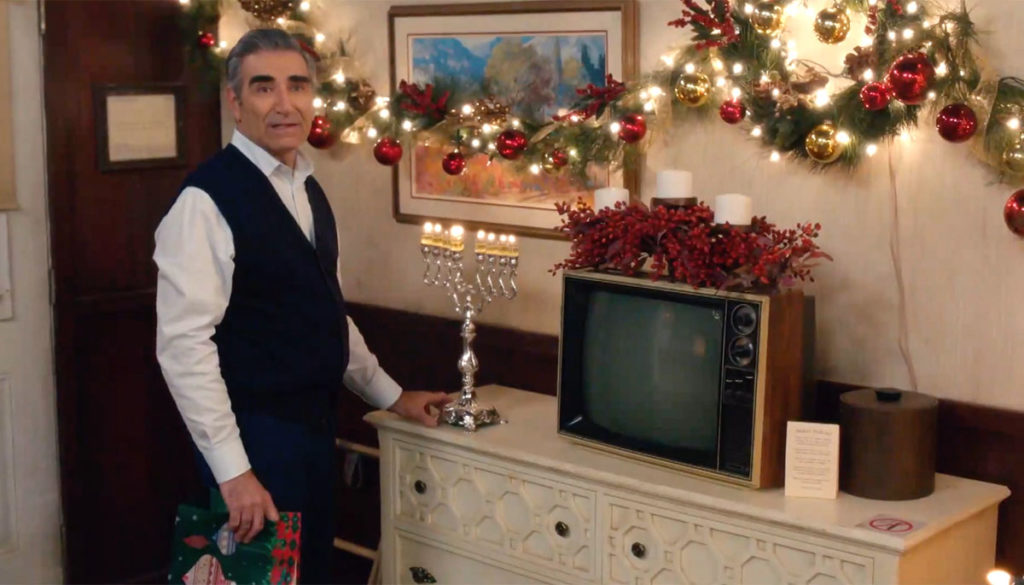
In the holiday special, Johnny Rose tells his family he wants to throw a Christmas party, just like the old times. Even though he’s Jewish, the Christmas party reminds him of a time when his family came together. Hijinks ensue, obviously, but it ends on a really touching moment of the Roses at the motel. Also, in this episode, Stevie wishes Patrick a “Merry Christmas,” but not David, and David is offended. He responds, “I’m a delightful half-half situation.” A delightful half-half situation! How wonderful!! Interfaith identity was also expressed throughout the 5th season — from references to Alexis’s bat mitzvah tiara, David going on Birthright, and Johnny playing on his Hebrew school baseball team. What a show.
The Best LGBTQ+ Jewish Representation
Abbi dating a woman, Broad City. Oh, you thought we were done kvelling over Broad City? Silly you. In an excellent example of character development, the fifth season saw Abbi once again entering the folds of dating, but this time, in her first real relationship with a woman: Leslie, played by the wonderful Clea DuVall. The show doesn’t make a big deal of it, because it’s not a big deal — Abbi’s bisexuality isn’t the punchline to any joke, just another facet of who she is.
The Best Jewish Reality TV Show Contestant
Hester Sunshine, Project Runway. This year saw the reboot of Project Runway, with Jewish model Karlie Kloss as the new host. The shining spot of the season? None other than the queer Jewish contestant, Hester Sunshine, who’s as charming and whimsical as the name suggests. “I want to show that fashion can be more than this all-black dressing and can be taken as something more fun,” she told Alma. While she didn’t win the season, she won our hearts.
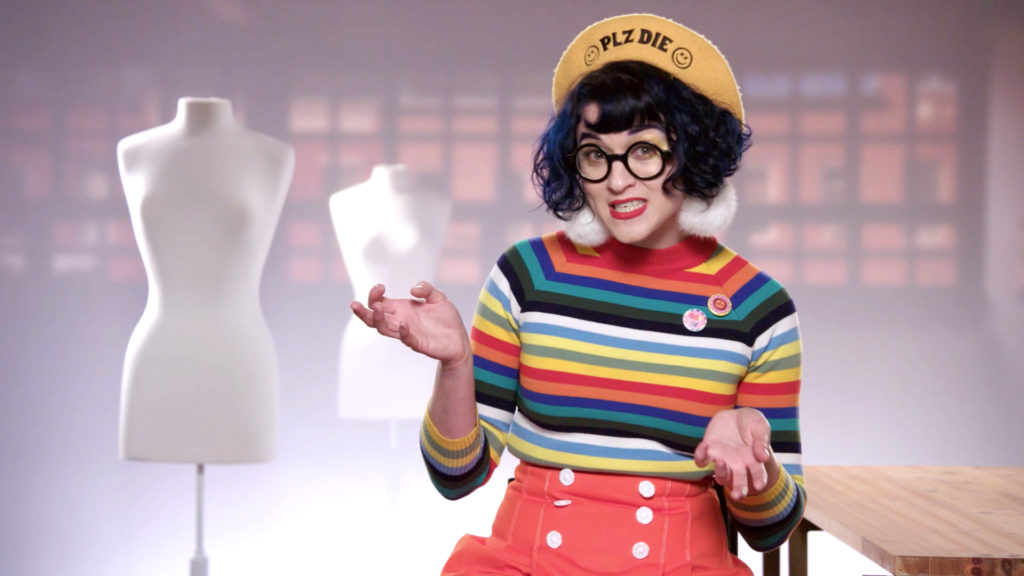
(Runner up: Alexander Rosenberg of Blown Away.)
The Best Jewish Joke on TV
“Three Drinks,” Episode 12, Crazy Ex-Girlfriend. This is representation for petite Jewesses!! In episode 12, Rebecca (Rachel Bloom) goes to Nathaniel’s house to sleep with him. He asks her if she’s drunk: “Did you have, like, a billion drinks tonight?” And she responds, “No, I did not have a billion, sir. I had three, which to a petite Jewess equals a billion.” Amen. Just look how many people tweeted about this A+ joke:
Representation!! Thank you, Crazy Ex-Girlfriend.
The Best Animated Jew
Andrew, Big Mouth. Representation in animation, yes!

Season two of Nick Kroll and Andrew Goldberg’s show about their Jewish childhoods in Westchester, New York truly delivered. And we are beyond grateful for Andrew (voiced by John Mulaney, not a Jew). From the Mets poster in his bedroom to scenes around Jewish guilt and questions over whether certain Jews are white, Andrew is every anxious Jewish teen.
Super Jewy
The Best Talmud Reference
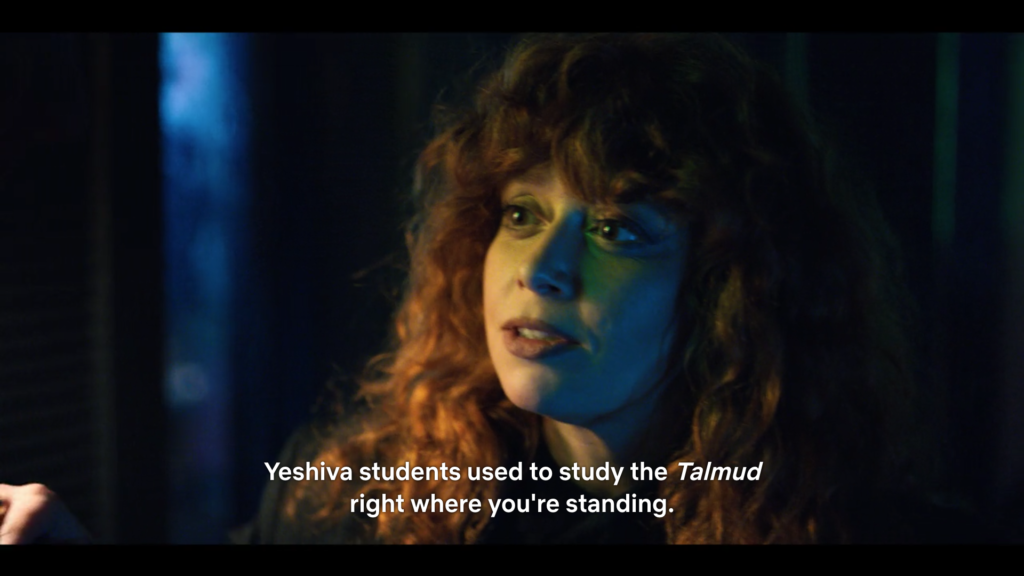
Nadia’s pick up line, Episode 1, Russian Doll. “Yeshiva students used to study the Talmud right where you’re standing,” Nadia tells John in the pilot episode before they sleep together. No further commentary needed.
The Best Bar/Bat Mitzvah Scene
Episode 5, Brooklyn Nine-Nine. There was an entire plot revolving around a bar mitzvah DJ in the sixth season of Brooklyn Nine-Nine. From the “Hava Nagila” to the fact that “no one likes hip-hop more than a 13-year-old Jewish boy” to the light-up JUSTIN decorating the room… it was perfect.

The Best Jewish Prayer Moment
“Mi Sheberach,” The Marvelous Mrs. Maisel. In episode 3, Midge Maisel insists on helping her friend, Mary, plan her wedding. In negotiating for a better room, she suggests saying a prayer for healing, and recites the Mi Sheberach. She does a pretty good job!
The Best Jewish Holiday Portrayal
Passover seder, GLOW. In episode 6 of the third season of everybody’s favorite female wrestling show, Melrose (played by Jackie Tohn) leads the women of GLOW in a makeshift seder in the Nevadan desert. It turns into a conversation about inherited trauma, and Tohn discusses her real great aunt who was murdered in the Holocaust. (Read our interview with Jackie Tohn about that scene here!) It was warm, beautiful, and unexpected in the best way.
The Best Jewish History Moment
Daniel Radcliffe. Daniel Radcliffe (you know, Harry Potter), went on the show Who Do You Think You Are? and learned about the tragic impact of anti-Semitism on his family. Feel a little weird calling this “Best” because it’s super sad, but it’s a very moving moment.
The Best Lilith
Chambers. The Jewish feminist demon Lilith truly had a moment on Netflix this year. There were two Liliths: the one in Chilling Adventures of Sabrina, and one in Chambers. Why does Chambers win? The Jewish creator, Leah Rachel, explained the nuance behind the character: “I’m not sure she’s a demon. I think she’s a very misunderstood mythological creature that carries with her very earned rage. It depends on how you look at her, whether you think she’s a god, or a demon. The line is very, very thin.” Hell yes.
Miscellaneous
The Best John Mulaney Reference to Annamarie Tendler, His Jewish Wife
Saturday Night Live. John Mulaney is a national treasure, and we love his jokes about his Jewish wife, Annamarie Tendler. When he hosted SNL this year — arguably the best episode of the season — his monologue talks about his absolute incredulity at the fact his mom would ask if his headstrong Jewish wife would convert to Roman Catholicism. (If you don’t feel like watching, transcription here.)
The Best Jewish Accessory
Jewess earrings, Broad City. No further comment necessary: We NEED these.
The Best (and Most Nuanced) JAP Take
“JAP Battle Reprise,” Crazy Ex-Girlfriend. (Read more here on why we love it so much.)
The Best Ruth Bader Ginsburg Portrayal
Kate McKinnon, “RBG Rap,” Saturday Night Live. It was the rap we didn’t know we needed!